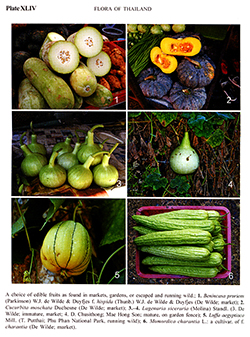e-Flora of Thailand
Volume 9 > Part 4 > Year 2008 > Page 460 > Cucurbitaceae > Lagenaria
Lagenaria siceraria (Molina) Standl.wfo-0000361549
Field Mus. Nat. Hist., Bot. Ser. 3: 435. 1930; Backer in Backer & Bakh. f., Fl. Java 1: 302. 1964; Keraudren in Aubrév. & J.-F.Leroy, Fl. Cambodge, Laos & Vietnam 15: 93. 1975; S.K.Chen in C.Y.Wu, C.Chen & S.K.Chen, Fl. Yunnan. 6: 348, pl. 91: 1–6. 1995.— Cucurbita siceraria Molina, Sag. Stor. Nat. Chili: 133. 1782. Plate XLIV: 3–4.
Accepted Name : This is currently accepted.
Synonyms & Citations :
Description : Robust climber or trailer to 5 m long; stem ridged, 2–5 mm diam., glabrescent. Probract absent. Tendrils 2-branched. Leaves: blade reniform suborbicular or ovate in outline, unlobed or obscurely 3–9-lobed, 5–30 cm diam., soft-hairy, cystoliths not obvious, base cordate, margin (sparsely) finely dentate, apex obtuse or acute; petiole 4–20 cm long, laterally at apex with 2 small (raised) glands. Male flowers: pedicel 40–300 mm long; perianth 40–60(–120) mm diam.; receptacle-tube (long-)campanulate, slightly bulbous at base, 10–15 mm long, soft-hairy; sepals spaced, narrowly triangular or linear, ca 5 mm long; petals broadly obovate, 20–40(–50) by (10–)15–35 mm, soft-hairy, margin (sub)entire; stamens inserted below halfway in the receptacle tube; anthers forming a ± elongate whole; filaments free, 2–3 mm long, glabrous; disc gland- like, at base of tube. Female flowers: pedicel 5–7 mm long; ovary cylindrical, reversed flask shaped or obovoid, 10–20 mm long, villose; receptacle-tube 2–3 mm long; sepals and petals similar to male flowers but somewhat smaller. Fruit solitary, ellipsoid or variously flask-shaped, often with a long ‘neck’, (6–)10–80 cm long, up to 200 mm wide, glabrescent; fruiting pedicel 5–10 cm long. Seeds subtruncate at both ends, (17–)10–20(–25) mm long, pale brown, ± 2-horned on the broader end, faces shallowly sculptured with two submarginal ridges.
Thailand : Cultivated almost everywhere.
Distribution : World-wide cultivated, Chile (type).
Vernacular : Khi-lu-sa (คิลูส่า)(Karen-Mae Hong Son); nam tao (น้ำเต้า)(Central); ma nam tao (มะน้ำเต้า)(Northern).
CommonName : Bottle gourd.
Uses: Young fruits and shoots are eaten as vegetables; mature fruits were formerly used as containers.
Notes: Lagenaria siceraria, very variable in fruit- and seed-size and shape, was already known in Pre-Columbian times in S America, but it possibly originates from Africa. Small-fruited forms, not necessarily wild forms, are known from e.g. the Moluccas or from Africa. Small immature fruits are frequently sold as a vegetable on markets in Thailand.

